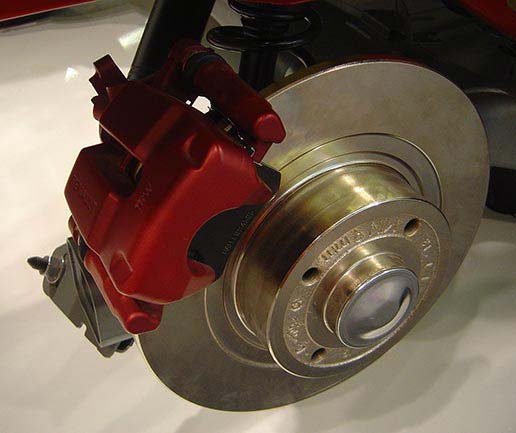
T A disc brake system with brake pads, caliper, and rotor -David Monniaux
Taking Care of the Brakes on Your Car
Once your car is in motion, there’s nothing more important than having the ability to stop -quickly and efficiently. Therefore, the brakes are one of the most important parts to your car. And yet, very few people know how to care for them – or even how to troubleshoot problems in advance.
Depending on how you drive, the amount of abuse your car’s brakes take on a daily basis can vary greatly. If your typical drive is coasting down a gentle slope that gradually lets you slow down, then congrats. Your brakes will probably last you a long time. But, if you’re like most of us, and your daily commute involves a lot of herky-jerky starts and stops, either on stoplight-filled streets or crowded freeways, then your brakes are taking a lot of abuse.
Brake Parts, and How They Work
The average driver, who is not a mechanic, really only needs to concern themselves with two brake parts: the brake pads, and the rotors. Understanding the roles each of these play will help you to learn exactly what a brake does, and maybe even how to drive more safely.
Your brake pads are exactly what they sound like: hard material (ranging from asbestos to organic compounds) that uses friction to stop the car. Brake rotors are round wheel brakes that the pads clamp onto to slow and stop the car.
Disc brakes use brake pads that are contained within calipers. When the pedal is pushed, they apply pressure to the rotor, which in turn slows the car. So it’s not surprising that, every so often, both pads and rotors need repair, and eventually replacement.
Brake Pad Maintenance
Usually, your car’s brakes are good at letting you know when they need a little tender loving care. If you happen to notice a shrill, high-pitched squeal (it’s hard to miss) coming from your car, that’s a sign that the brake pads are wearing out. Manufacturers include a small sheet of metal in the brake pad itself, called an indicator, which lets you know it’s time to replace them. The indicator usually rears its head when the brake pad is down to less than ¼ of an inch. If you hear this squeal -which sounds a lot like fingernails on a chalkboard -get your brake pads replaced, quick.
Not every set of brake pads comes with the indicator, though, so you can’t rely on them 100% of the time. There are some other indicators, though:
Soft Brakes: If it takes you longer than usual to stop, that’s a sign of brake pad wear.
Pushing Harder: If your brake pedal seems to go farther, or need more of a push, there could be a brake pad issue.
Rotor Maintenance
Rotors can usually last a driver through 2 or 3 sets of brake pads, but they do need to be examined from time to time for wear and warping. One indicator is if your steering wheel “wiggles” in your hands when your car is at a standstill.
If you hear or feel a grinding noise when you apply pressure to your brakes, chances are your pads are shot and you’re wearing down your rotors with every stop sign. Get your car checked out ASAP.
If your rotors are in need of replacement, you may be asked if you want to “turn” them instead. Turning your rotors basically means shaving them down until they are smooth again. This isn’t an option for all rotors, however – several new car models have slimmed down rotors, which may make them too thin for turning. You can check your owner’s manual or contact your dealer for more information on care of rotors.
Unlike an oil change, your car’s brake maintenance is not contingent upon a certain number of miles driven. But now that you know what to look (and listen) for, you’ll be able to stop on a dime, every time.










